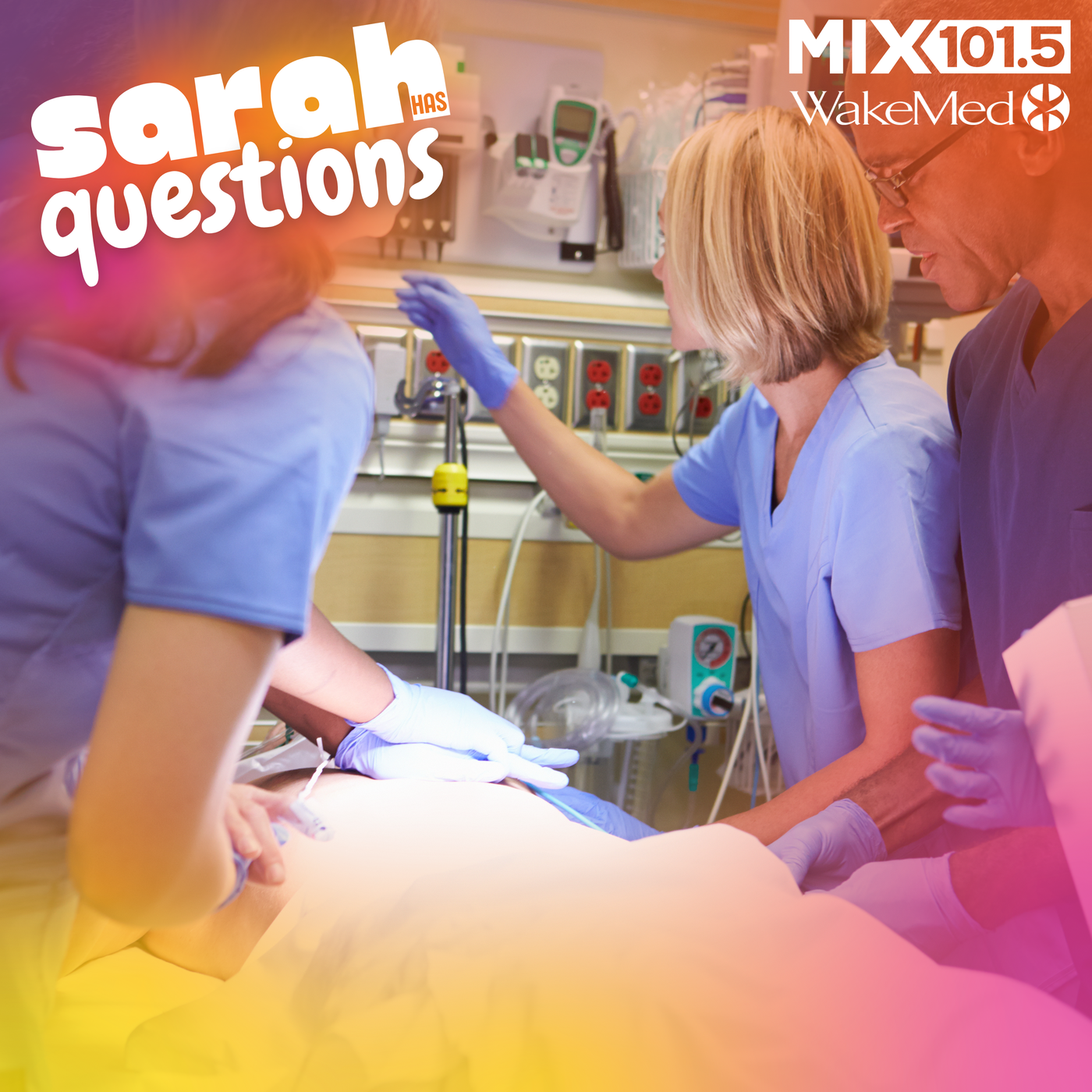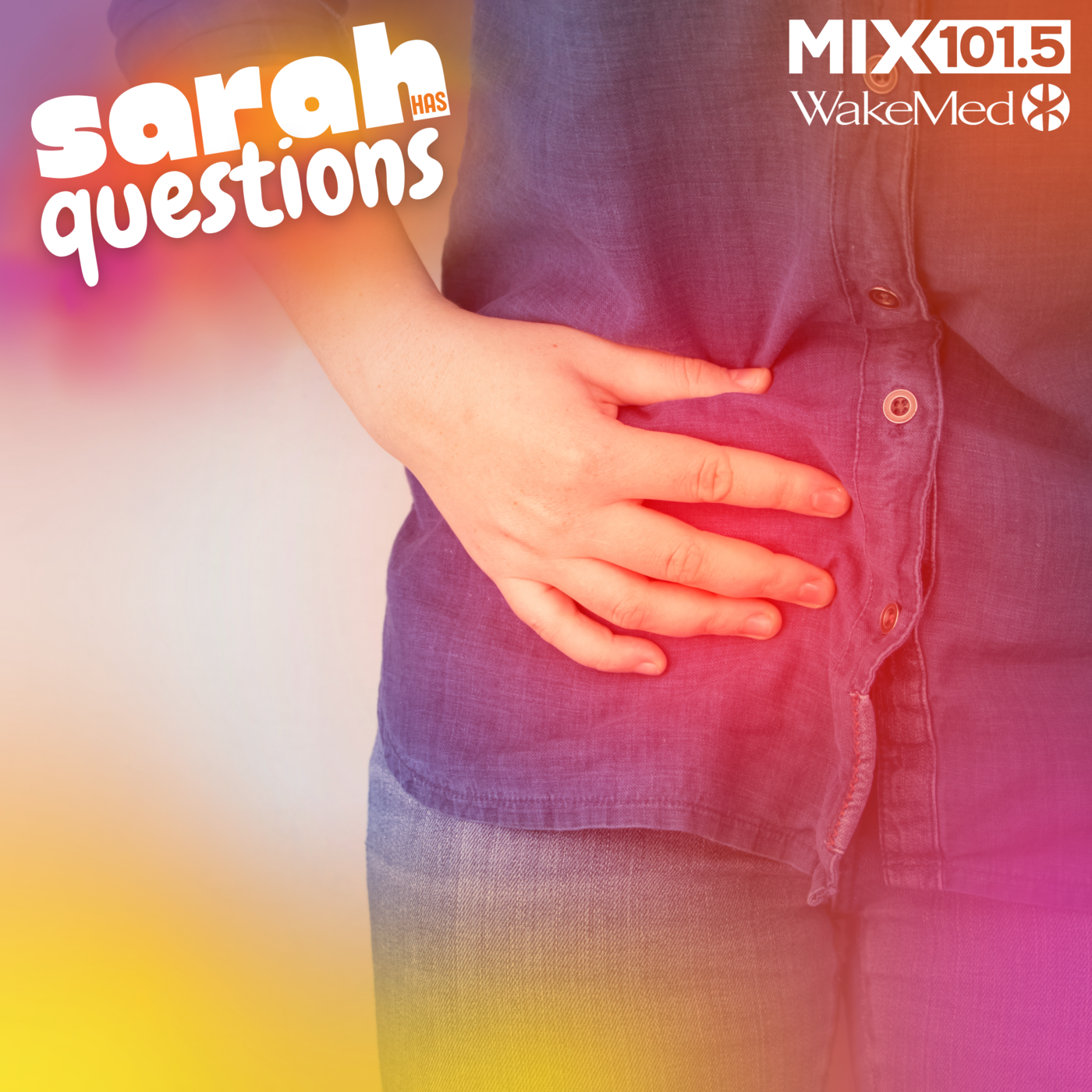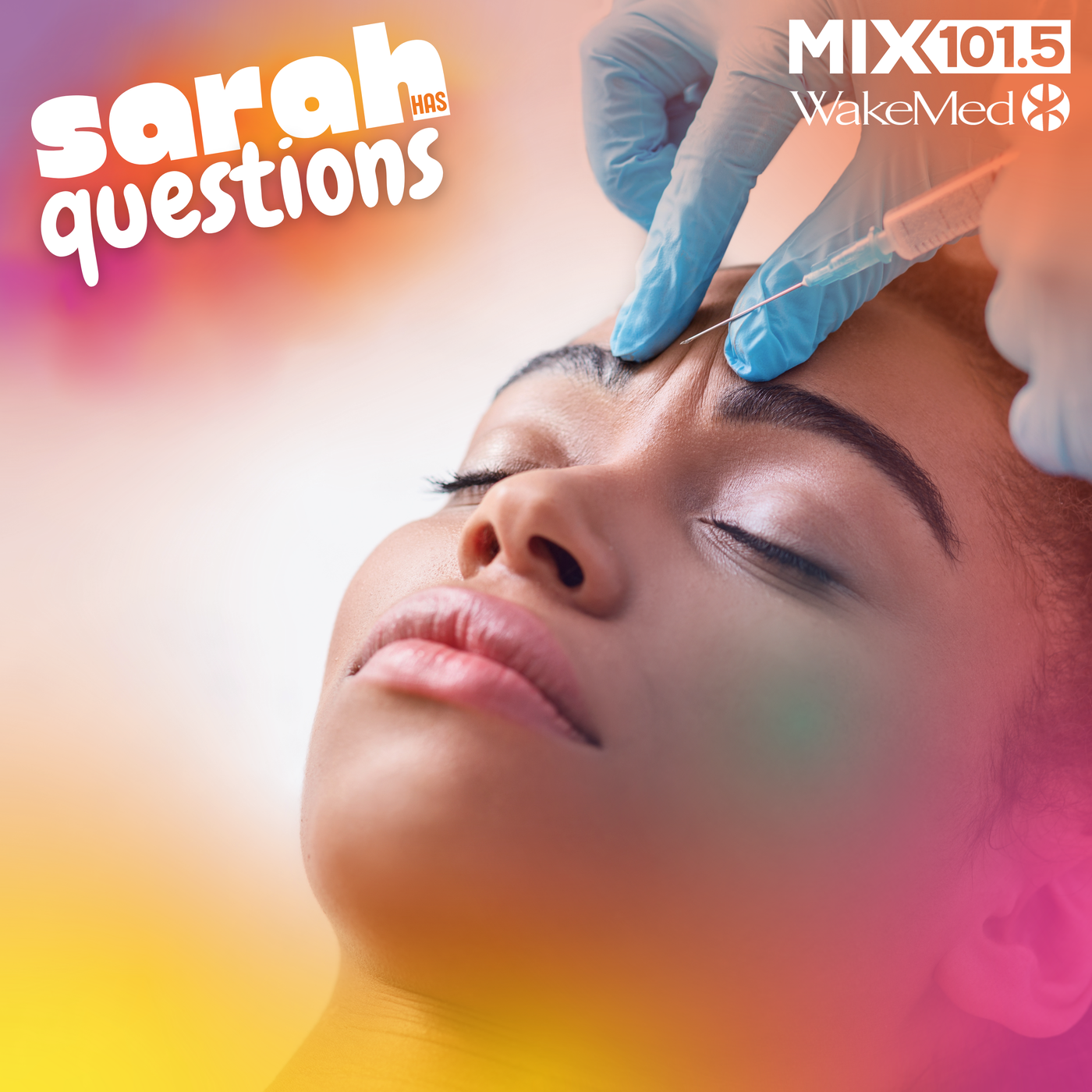
When it comes to life, wellness, health and medicine, we all have questions. Sarah King is not afraid to ask ANYTHING.
Is THIS normal? Is THAT a problem I should see a doctor about?
What can I do RIGHT NOW to keep fill in the blank from happening in the future?
Sarah King has questions, but instead of a 10-minute doctor’s appointment where she comes away without answers, she gets to sit down with world-class physicians for candid conversations. And she’s not afraid to ask anything! No topic is off limits from sex, infertility and menopause to mental health, exercise and "Do I really need probiotics?” Doctors from WakeMed in Raleigh, NC answer her questions...ALL of her questions!
Sarah has questions, and admit it, you do too! Sarah Has Questions is produced by MIX 101.5 in Raleigh, NC.
Follow the podcast
RSS Feed
We're digging into the confusing and often frustrating world of Irritable Bowel Syndrome (IBS). With gastroenterologist Dr. Luis Vazquez from WakeMed as our expert guest, we explore what IBS really is, how it’s diagnosed, and how to tell it apart from other gut conditions like Crohn’s and ulcerative colitis. Sarah shares her own journey with IBS since the age of 13.
From the role of fiber and diet to the mysteries of the gut microbiome, this episode covers the latest science on IBS and why why treatment looks different for each person.
00:00 IBS vs. IBD Symptom Differences
04:09 Red Flags for Digestive Health
08:58 Stress and IBS Connection
09:43 IBS: Nervous System Connection
13:45 Food Allergies and IBS Connection
18:01 Minimizing Medications for IBS Treatment
18:59 FODMAPs and Digestive Pain
24:22 "Living with IBS"

Ever wonder how stress truly impacts your mind and body? On this episode of Sarah Has Questions, we dive into cortisol—the so-called stress hormone—with WakeMed family nurse practitioner Crystal Evans. We learn how cortisol regulates your metabolism, sleep, blood pressure, and even that stubborn belly fat. Chronic stress and lack of sleep can throw your hormones way off, but Crystal has some real, actionable ways to manage it.
DISCLAIMER: The information presented in this podcast is intended to be educational and nothing said by the host or guests should be taken as medical advice. The information presented here is not a substitute for professional medical advice, diagnosis, or treatment. Your health is important, and seeking the advice of your own healthcare provider is always the best course of action.

We humans are ruled by our hormones. As women, hormonal changes can make us feel like completely different people. It's not just hot flashes and lack of libido, it's EVERYTHING.
In this episode Sarah is joined by Dr. Victoria Fashikin Thore from WakeMed to discuss the complex balance of hormones.
They talk about the roles of key hormones like estrogen, progesterone, and testosterone, and bust some common myths, like whether hormone replacement therapy is really as risky as it once seemed. Plus, they tackle real questions about digestive issues, stress, and why women should never settle for feeling less than their best.
00:00 "Why Hot Flashes Vary"
03:56 "Estrogen's Role in Women's Health"
08:35 "Stress's Impact on Health"
10:30 Estrogen's Role in Vaginal Health
14:46 "HRT Study Misconceptions Explained"
16:15 Breast Cancer Risk and Hormones
19:45 "Thanks and Be Well"
DISCLAIMER: The information presented in this podcast is intended to be educational and nothing said by the host or guests should be taken as medical advice. The information presented here is not a substitute for professional medical advice, diagnosis, or treatment. Your health is important, and seeking the advice of your own healthcare provider is always the best course of action.

When should you rush to the ER, and when is urgent care enough? Most of us have faced that question at some point. In this episode, Sarah King talks with WakeMed ER doctor Graham Snyder. The two break down common scenarios—from cuts, fevers, and broken bones, to allergic reactions, animal bites, and sports injuries. They discuss the nuances that determine whether you really need the full arsenal of emergency services or if your situation can be handled in a lower-stress, often quicker setting. Whether it's a child’s high fever, a suspected concussion, or the aftermath of using an EpiPen, Dr. Graham Snyder offers practical guidance to help you decide confidently where to turn in a medical crisis. It's all about knowing when to seek help and understanding what each type of care is equipped to handle. If you’ve ever found yourself asking, “Is this an ER thing?” you won’t want to miss these answers.
DISCLAIMER: The information presented in this podcast is intended to be educational and nothing said by the host or guests should be taken as medical advice. The information presented here is not a substitute for professional medical advice, diagnosis, or treatment. Your health is important, and seeking the advice of your own healthcare provider is always the best course of action.

Ending all communication with your parents is a tough decision a lot of people are making. Getting to the point of "no contact" comes with anguish on both sides. Dr. Micah Krempasky from WakeMed has advice on what to do before you reach this point, and how to manage life after.
Find Dr. Krempasky at wakemed.org.
Submit questions for future episodes at wralfm.com/sarahhasquestions.
Instagram https://www.instagram.com/sarahhasquestions/
You Tube https://www.youtube.com/@SarahHasQuestions
TikTok https://www.tiktok.com/@sarahhasquestions
DISCLAIMER: The information presented in this podcast is intended to be educational and nothing said by the host or guests should be taken as medical advice. The information presented here is not a substitute for professional medical advice, diagnosis, or treatment. Your health is important, and seeking the advice of your own healthcare provider is always the best course of action.

In this episode, Sarah is joined by Dr. Strahinja Talic, a primary care physician from WakeMed, to tackle the hot topic of fevers. We’ve all had them, our kids have had them, but what really causes a fever? Are we contagious when we have one? How high is too high?
From the science behind why our bodies heat up when we’re sick, to the myths and realities about treating fevers in both adults and children, Sarah and Dr. Talic break it all down. Spoiler: protein and fat are your friends during a fever!
Submit questions for future episodes at wralfm.com/sarahhasquestions.
DISCLAIMER: The information presented in this podcast is intended to be educational and nothing said by the host or guests should be taken as medical advice. The information presented here is not a substitute for professional medical advice, diagnosis, or treatment. Your health is important, and seeking the advice of your own healthcare provider is always the best course of action.

The foods we eat can cause inflammation. Inflammation can lead to chronic disease. Chronic disease can exacerbate inflammation. It's a vicious cycle that's hard to break. Registered Dietician Marissa Robinson shares advice on which foods to eat and what to avoid to prevent inflammation. Find Marissa at wakemed.org.
Submit questions for future episodes at wralfm.com/sarahhasquestions.
Instagram https://www.instagram.com/sarahhasquestions/
You Tube https://www.youtube.com/@SarahHasQuestions
TikTok https://www.tiktok.com/@sarahhasquestions
DISCLAIMER: The information presented in this podcast is intended to be educational and nothing said by the host or guests should be taken as medical advice. The information presented here is not a substitute for professional medical advice, diagnosis, or treatment. Your health is important, and seeking the advice of your own healthcare provider is always the best course of action.

If you get diagnosed with prediabetes, does that mean you'll eventually be diabetic, or is it your wake-up call to turn things around? According to Dr. Michael Soboeiro from WakeMed by the time you're prediabetic you've probably been dealing with insulin resistance for years. How does this happen? Why does it happen so often. And what can we do about it?
Find Dr. Soboeiro at wakemed.org.
Submit questions for future episodes at wralfm.com/sarahhasquestions.
Instagram https://www.instagram.com/sarahhasquestions/
You Tube https://www.youtube.com/@SarahHasQuestions
TikTok https://www.tiktok.com/@sarahhasquestions
DISCLAIMER: The information presented in this podcast is intended to be educational and nothing said by the host or guests should be taken as medical advice. The information presented here is not a substitute for professional medical advice, diagnosis, or treatment. Your health is important, and seeking the advice of your own healthcare provider is always the best course of action.

Is your body image realistic, or are you fixated on your flaws? For most of us there are things we don't like about our bodies. But what if we changed our perceived body image instead of covering the bits we don't like? Dr. Micah Krempasky has some advice on how we can change our attitudes toward how we look.
Find Dr. Krempasky at wakemed.org.
Submit questions for future episodes at wralfm.com/sarahhasquestions.
Instagram https://www.instagram.com/sarahhasquestions/
You Tube https://www.youtube.com/@SarahHasQuestions
TikTok https://www.tiktok.com/@sarahhasquestions
DISCLAIMER: The information presented in this podcast is intended to be educational and nothing said by the host or guests should be taken as medical advice. The information presented here is not a substitute for professional medical advice, diagnosis, or treatment. Your health is important, and seeking the advice of your own healthcare provider is always the best course of action.

Botox isn't just for your face. It's a treatment for migraines, TMJ and even overactive sweating. Sarah King has lots of questions for Dr. Gita Fleischman from wakemed.org. She talks us through Botox and how it works its cosmetic magic on your face, and its many other uses. Connect with Sarah and the show at wralfm.com/sarahhasquestions.
DISCLAIMER: The information presented in this podcast is intended to be educational and nothing said by the host or guests should be taken as medical advice. The information presented here is not a substitute for professional medical advice, diagnosis, or treatment. Your health is important, and seeking the advice of your own healthcare provider is always the best course of action.